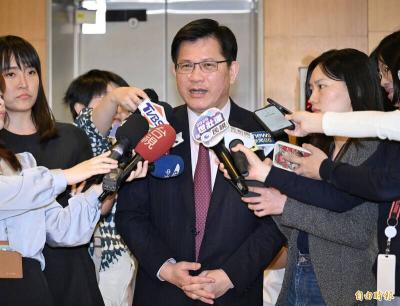The Straits Exchange Foundation (SEF) yesterday said it was still waiting for Mainland Affairs Council authorization to discuss the planned economic cooperation framework agreement (ECFA) with Beijing during the third cross-strait talks scheduled for the first half of the year.
SEF Chairman Chiang Pin-kung (江丙坤) said the SEF needed the council’s authorization to engage in talks with Beijing on the issue.
President Ma Ying-jeou (馬英九) has said the issue would be on the agenda of the third round of talks between Chiang and his Chinese counterpart, Association for Relations Across the Taiwan Strait Chairman Chen Yunlin (陳雲林).
Chiang yesterday said that inclusion of the topic in the forthcoming talks would “hinge on future developments,” adding that they had to receive the council’s authorization.
Chiang made the remarks during a tea party held to celebrate the foundation’s 18th birthday in Taipei yesterday afternoon.
Chairwoman Lai Shin-yuan (賴幸媛) yesterday confirmed the SEF would require the council’s authorization to proceed.
The topic, however, “will not be an issue for negotiation” during the upcoming Chiang-Chen talks.
The foundation has said that both sides would “talk” rather than “negotiate” the issue during the upcoming Chiang-Chen meeting.
Lai described an ECFA as a “special” economic pact, the content and scope of which would require dialogue between the two sides.
“It will not run counter to the spirit of the WTO,” she said. “The government will also make sure that the interests of all industries are upheld.”
If both sides are to sign an ECFA, Lai said it would be different from a free-trade agreement (FTA) signed between two WTO members.
An FTA is different from an ECFA, she said, because an FTA takes a long time to negotiate and covers a broad area.
Lai said that any WTO member only signs an FTA based on its own interests.
While the content of the accord had not been finalized, Lai said it was premature to worry about what it would be called.
Lai said the economic pact would target certain industries at the initial stage, but both sides had to negotiate and agree on the matter. The government would also communicate with the public and industries. They would explain the matter to the legislature after completing the evaluation and then talk with Beijing, she said.
Meanwhile, former president Chen Shui-bian (陳水扁) reportedly rejected China’s attempt to negotiate an ECFA.
Democratic Progressive Party Legislator Ker Chien-ming (柯建銘) told reporters after visiting Chen at the Taipei Detention Center that Chen told him that an ECFA was a scheme Beijing was using to push its political agenda.

Taiwan would welcome the return of Honduras as a diplomatic ally if its next president decides to make such a move, Minister of Foreign Affairs Lin Chia-lung (林佳龍) said yesterday. “Of course, we would welcome Honduras if they want to restore diplomatic ties with Taiwan after their elections,” Lin said at a meeting of the legislature’s Foreign Affairs and National Defense Committee, when asked to comment on statements made by two of the three Honduran presidential candidates during the presidential campaign in the Central American country. Taiwan is paying close attention to the region as a whole in the wake of a

Chinese Nationalist Party (KMT) Chairman Eric Chu (朱立倫), spokeswoman Yang Chih-yu (楊智伃) and Legislator Hsieh Lung-chieh (謝龍介) would be summoned by police for questioning for leading an illegal assembly on Thursday evening last week, Minister of the Interior Liu Shyh-fang (劉世芳) said today. The three KMT officials led an assembly outside the Taipei City Prosecutors’ Office, a restricted area where public assembly is not allowed, protesting the questioning of several KMT staff and searches of KMT headquarters and offices in a recall petition forgery case. Chu, Yang and Hsieh are all suspected of contravening the Assembly and Parade Act (集會遊行法) by holding

President William Lai (賴清德) has appointed former vice president Chen Chien-jen (陳建仁) to attend the late Pope Francis’ funeral at the Vatican City on Saturday on his behalf, the Ministry of Foreign Affairs said today. The Holy See announced Francis’ funeral would take place on Saturday at 10am in St Peter’s Square. The ministry expressed condolences over Francis’ passing and said that Chen would represent Taiwan at the funeral and offer condolences in person. Taiwan and the Vatican have a long-standing and close diplomatic relationship, the ministry said. Both sides agreed to have Chen represent Taiwan at the funeral, given his Catholic identity and

Taiwan would welcome the return of Honduras as a diplomatic ally if the next president of that country decides to make such a move, Minister of Foreign Affairs Lin Chia-lung (林佳龍) said today. “We would welcome Honduras if they want to restore diplomatic ties with Taiwan after their elections,” Lin said during a legislative hearing. At the same time, Taiwan is paying close attention to the Central American region as a whole, in the wake of a visit there earlier this year by US Secretary of State Marco Rubio, Lin said. Rubio visited Panama, El Salvador, Costa Rica and Guatemala, during which he